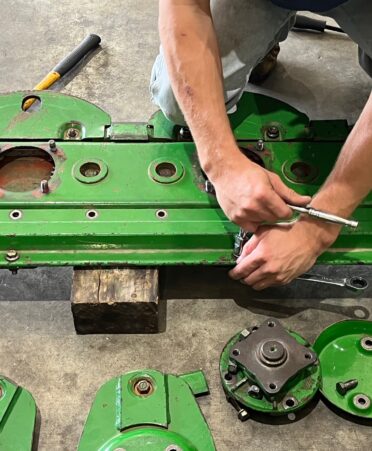(WACO, Texas) – When working with farm and ranch equipment, it is important to know the risks involved.
“To be safe, you have to be smart — educate yourself, read the manual, know the capabilities and limitations of the equipment you are working with,” said Matthew Peterson, an instructor in Texas State Technical College’s Diesel Equipment Technology program.
Besides working with diesel equipment, students also get their hands on disc mowers, mower conditioners, tractors and round and square balers.
Safety is top on the minds of instructors and students. People using farm and ranch equipment are at risk of being crushed or thrown from tractors along with suffering amputations, cuts and fractures.
“Over the years, power equipment has gotten more complex,” Peterson said. “The need for in-depth service literature and electronic diagnostic equipment has risen sharply. A quick fix is relative, but preventive maintenance is faster and cheaper than a repair.”
There were more than 130 fatal work injuries to agricultural workers in 2021, according to the U.S. Bureau of Labor Statistics. More than 120 of the deaths were men. More than 30 of the people who died on the job were self-employed.
This was the lowest number since 128 agricultural workers died in 2013, according to the labor statistics agency.
Peterson said people who buy new farm and ranch equipment should first read the owners’ manual and maintenance manual before using. He said people should also know what to do in emergency situations and keep a first aid kit accessible.
According to the Texas Department of Insurance, the season depends on the kind of clothing people should wear when working with farm and ranch equipment. For the fall, people should tie hooded jacket strings, cut hanging strings off of clothing, wear non-flammable clothing and remove or cover jewelry, such as bracelets, earrings and necklaces.
When the weather gets cold, the state insurance department recommends a scarf be tucked inside jackets, wear dry, warm gloves and non-slip footwear. A warm hat is also recommended to maintain body heat and to protect the ears.
TSTC offers associate degrees in Diesel Equipment Technology – Heavy Truck Specialization and Off-Highway Specialization and certificates of completion in Diesel Equipment Technology – Heavy Truck, Off-Highway Specialization and Off-Highway Equipment Specialization.
For more information on TSTC, go to tstc.edu.
